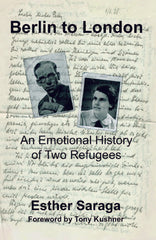Berlin to London
An Emotional History of Two Refugees
Saraga, Esther
Foreword by Tony Kushner
Esther Saraga tells a touching and disturbing story of her parents’ emigration from Germany and their lives in Britain during and after the war. She questions whether ‘gratitude’ to Britain was the emotion most expected of them, and she cringes at memories of herself colluding with the idea that her mother was ‘the silly one’. Part autobiographical, part history, this book recreates a forgotten world, full of tensions, harsh realities, but, in the end, a tale of survival and a future.
Rabbi The Baroness Neuberger DBE
Esther Saraga’s Berlin To London opens up an important conversation with her parents, Lotte and Wolja, that she never managed to have whilst they were alive. Saraga deeply regrets that, and yet the book in a way shows how the conversation with our dead never really stops. We come to understand how difficult it was for parents of children settled in another country to share the experience of forced exile. We come to see Lotte and Wolja's experience as emblematic. They shine a light on the lives of today's refugees the world over.
Jackie Kay
This is one of the most powerful books you will ever read in what it is to be a refugee. Essential reading for those who want to understand the personal impact of being a forced migrant – whether past or present.
Professor Tony Kushner, University of Southampton
Told in the light of injuries suffered by today’s refugees in Britain, Berlin to London, provides a marvellously engaging, but harrowing, account of the injuries suffered by Lotte and Wolja Saraga as refugees from Hitler’s Germany. So well does their daughter, Esther, convey their tale, with asides gleaned from her years of psychoanalysis and involvement in feminist and socialist politics, one can readily understand Lotte’s exasperated complaint, ‘Can’t you let history happen without you?’. No wonder Esther’s Berlin to London gives a gripping ‘politics is personal’ answer.
Janet Sayers, author of several books including Mothering Psychoanalysis and Freudian Tales
In this book the emotional journeys of two German Jewish refugees are reconstructed from a substantial collection of family papers, which are used imaginatively to explore and illuminate a wider history. The letters evoke how it felt at the time to be a refugee and express eloquently the distress and losses involved in exile, separation and internment, providing intense dynamic snapshots of how they managed their emotions from day to day through changing external events.
272 pages, 25 illustrations
Copyright: 1/1/2019








